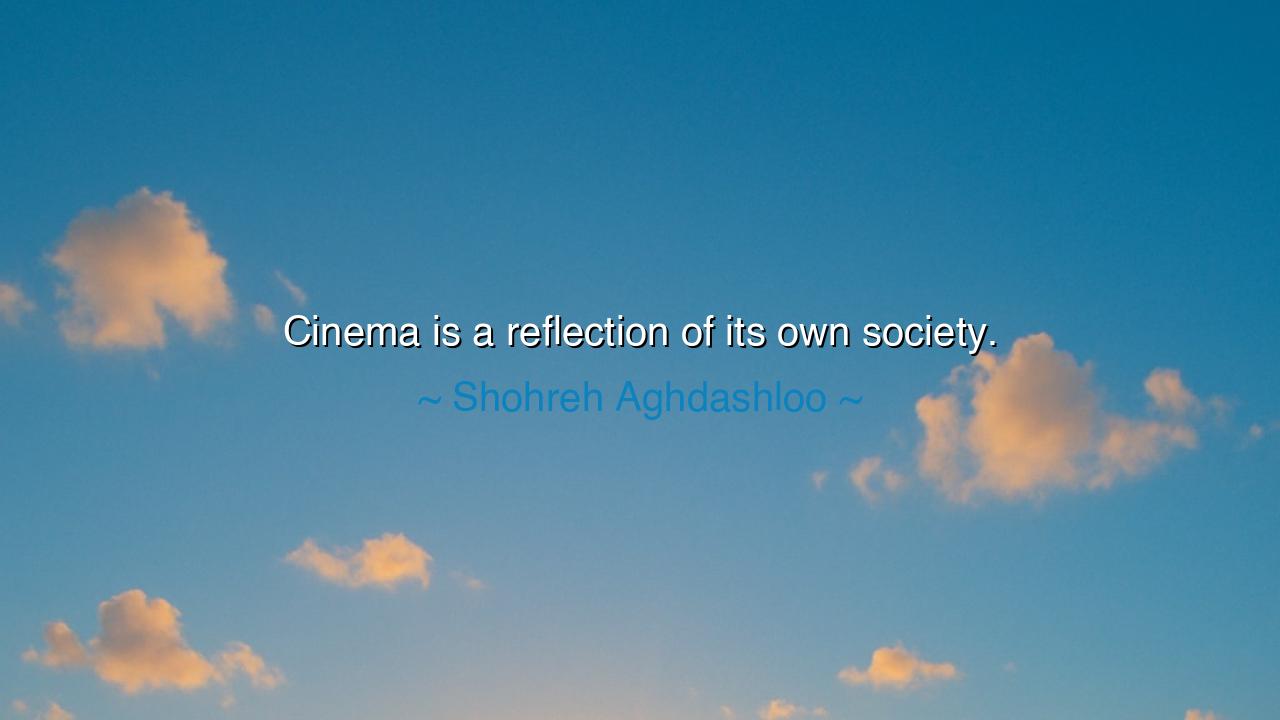
Cinema is a reflection of its own society.






Hear the words of Shohreh Aghdashloo, the voice of an artist who has walked between East and West, who has borne witness to exile and to home, to silence and to speech. She declared: “Cinema is a reflection of its own society.” These words are as a mirror held up before the world, reminding us that art does not stand apart from life but is born of it, shaped by it, and destined to reveal its hidden truths.
The cinema, though only a century old, is one of the most powerful mirrors humanity has ever forged. In it, we see not only stories of heroes and villains, but the desires, fears, and contradictions of the age. When a society longs for escape, its films are filled with fantasy and wonder. When a society trembles in fear, its films echo with shadows, monsters, and dystopias. When a society dreams of justice, its films rise with voices of rebellion, equality, and hope. Thus, the screen reflects not just images, but the very soul of a people.
History gives us proof. In the years of the Great Depression, American cinema offered the shining musicals and comedies of Hollywood. Audiences, burdened with poverty, found in these films not only laughter but a reflection of their longing for joy amidst despair. After the Second World War, Italian neorealism emerged, showing the rubble of streets, the hunger of families, and the quiet dignity of survival. These films did not invent suffering—they revealed it, holding a mirror so that society might not forget its wounds.
Consider too the films of Iran, the land of Aghdashloo herself. Directors like Abbas Kiarostami and Asghar Farhadi did not create fantasies far removed from their people; they showed lives restrained by tradition, haunted by politics, filled with quiet acts of resistance. In their simple stories, the reflection of their society was clear: its struggles, its beauty, its contradictions. And though governments sought to silence them, their films traveled the world, carrying with them the truth of their nation’s soul.
The teaching is profound: cinema is not only entertainment but testimony. It records the heartbeat of its age, even when that heartbeat is fractured, even when it is silenced. In dictatorships, films become whispers of defiance. In free societies, they become debates about identity, justice, and morality. And even in the most commercial of stories, if one looks closely, the mirror remains: revealing what the people desire, what they fear, and what they value.
The lesson for us is this: to watch a film is not only to consume a story, but to glimpse the spirit of the time that gave birth to it. Let us then approach cinema not merely with amusement, but with inquiry. Ask of every film: what does this reveal about the society that made it? What does it show of their longings, their injustices, their hopes? To ask these questions is to see beyond the screen, into the living heart of civilization itself.
Therefore, take practical steps: support films that reveal truth, not only those that soothe; seek out voices from different cultures, for their mirrors show us what our own eyes may miss; teach the young to see films not just as spectacle, but as testimony of human life. For in understanding cinema as a reflection, we learn to understand ourselves, and in understanding ourselves, we gain the wisdom to change.
So remember the wisdom of Shohreh Aghdashloo: “Cinema is a reflection of its own society.” To gaze upon the screen is to gaze upon humanity itself. Let us look carefully, with open eyes and open hearts, so that the mirror of film may not only reveal what we are, but inspire us to become greater than we have been.






AAdministratorAdministrator
Welcome, honored guests. Please leave a comment, we will respond soon